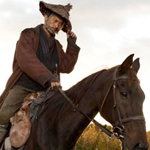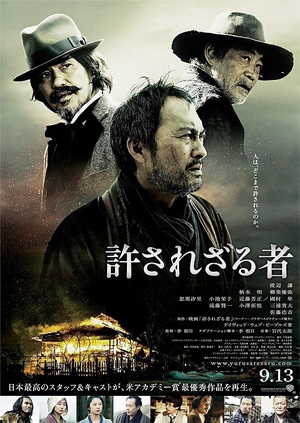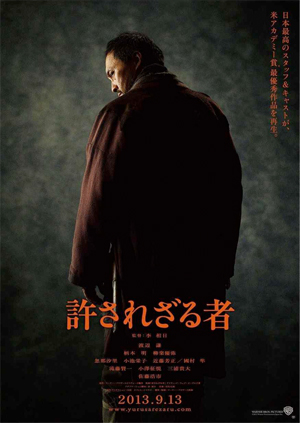 There has long been a beautiful cultural exchange between America and Japan. They captivated us with their ninjas and their karate, we let them use our rockabilly. We loaned them Steven Seagal, they sent him back polished into an aikido master. A few samurai movies have been famously remade as westerns, but it’s about time it went in the other direction. Director Sang-il Lee (HULA GIRLS, VILLAIN) has taken a little 1992 movie by the name of Clint Motherfuckin Eastwood’s Best Picture, Best Director, Best Supporting Actor and Best Film Editing Oscar winner UNFORGIVEN and faithfully remade it as a samurai picture.
There has long been a beautiful cultural exchange between America and Japan. They captivated us with their ninjas and their karate, we let them use our rockabilly. We loaned them Steven Seagal, they sent him back polished into an aikido master. A few samurai movies have been famously remade as westerns, but it’s about time it went in the other direction. Director Sang-il Lee (HULA GIRLS, VILLAIN) has taken a little 1992 movie by the name of Clint Motherfuckin Eastwood’s Best Picture, Best Director, Best Supporting Actor and Best Film Editing Oscar winner UNFORGIVEN and faithfully remade it as a samurai picture.
I think this is the type of remake that’s a sign of respect, not exploitation of an existing title. It’s saying “we all know this great movie UNFORGIVEN, I mean what kind of assholes do you take us for, but here is another take on it for you to enjoy a bit before returning to the original.” Even in that case the impossible part about remaking a Clint Eastwood movie has got to be finding a guy to replace Clint Eastwood. I gotta say, Ken Watanabe was a brilliant choice. He has a stoicism and masculine presence that’s reminiscent of Clint, he kinda looks like him on the poster, and he even knows the guy well as the lead in Eastwood’s underrecognized-even-while-nominated-for-best-picture directorial work LETTERS FROM IWO JIMA. But his character Jubei is not just an imitation of Clint’s William Munny. He’s a little less gruff, and even more internal. He talks a little less I think, even skipping a perfect spot to fit in the famous line “Deserve’s got nothin to do with it.” I guess he figures it goes without saying.
 But this is not one of the retellings where you gotta think about it for a minute to see where it comes from. It’s very faithful to the original movie but transported to Hokkaido, a mountainous part of Japan. Jubei wasn’t a thief like Munny. He’s an outlaw because his side lost and the government went hunting down all the old samurai. And he fought back.
But this is not one of the retellings where you gotta think about it for a minute to see where it comes from. It’s very faithful to the original movie but transported to Hokkaido, a mountainous part of Japan. Jubei wasn’t a thief like Munny. He’s an outlaw because his side lost and the government went hunting down all the old samurai. And he fought back.
That was a long time ago by the time of the incident where two crazy brothers (Yukiyoshi Ozawa and Takahiro Miura, I think?) get out of control in a whorehouse and one of them slashes up Natsume (Shiori Kutsuna).
For such a masculine story this does a great job of illustrating the horrendous way women are treated. The sheriff type Ichizo (Koichi Sato, younger than Gene Hackman and with a fancy mustache) comes in and has this air about him of thinking he’s very fair and reasonable as the prostitutes ask for a little too harsh of justice, demanding that the brothers be decapitated on the spot. But his alternative is just to beat them a little bit with a wooden sword and let them go. A spanking, basically. The madam is outraged and Ichizo kind of shakes his head at her like “Women, what are you gonna do.” It’s not until the male owner of the establishment tells her to shut up and pleads his case that the punishment is raised… to a fine. Because Natsume’s mutilation will cost the whorehouse money they’ll have to give the owner some horses.
In this world where the law does not bring justice these women feel they must call upon the help of the lawless. It could be anybody who would come and collect the reward but of course it happens to be Jubei, a man who once represented a code of honor, was turned into a criminal, regrets the killing he had to do to survive, stopped drinking and promised his wife (now dead three years) he would never kill again. He’s got two kids and some farm animals and life seems like it’s okay, not great. Then his “old war buddy” Kingo (Akira Emoto) shows up to see if he wants in on this whore-slasher bounty.
Emoto (who was in GODZILLA VS. SPACE GODZILLA) is really good as a guy who knows he’s past his prime but who’s more formidable than he lets on. Somehow he totally makes sense as the Japanese Morgan Freeman, although I looked up his filmography and saw no narrating gigs.
 One of the posters shows Watanabe with his back to us like Eastwood on his poster, and I thought I saw some pictures with cowboy hats so I wasn’t even sure if this was gonna be a samurai movie. It’s not entirely different from a western because alot of the clothing is similar, everybody’s on horses, and there are guns. But those things are still pretty crude, they have their limitations, and guys who used to be samurai still carry their swords. Don’t worry, he’s not just a cowboy with a sword for backup. He wears one of those pointy hats and he looks great.
One of the posters shows Watanabe with his back to us like Eastwood on his poster, and I thought I saw some pictures with cowboy hats so I wasn’t even sure if this was gonna be a samurai movie. It’s not entirely different from a western because alot of the clothing is similar, everybody’s on horses, and there are guns. But those things are still pretty crude, they have their limitations, and guys who used to be samurai still carry their swords. Don’t worry, he’s not just a cowboy with a sword for backup. He wears one of those pointy hats and he looks great.
The most changed character, and I think maybe even improved from the original, is Goro (Yûya Yagira), the remake’s answer to the Schofield Kid. He’s still a cocky little hotshot but he’s more of a trickster character, a wild drunk often scratching himself like a dog or a tweaker, climbing in trees and shit. This guy Yagira gives a really good comic performance, a funny braggart buffoon without being too broad for the movie, and then when he breaks down crying after his first murder it’s just heartwrenching.
You know what, I kind of feel proud as an American that we actually had a movie good enough to do a respectable foreign remake of. I’m not counting loose Bollywood musical adaptations although that’s pretty cool too. But how do you translate “cowboys and Indians” to Japan? Well, Jubei’s wife was Ainu, who were a native culture of Japan and Russia and at that time they were struggling with the new government. Goro is also Ainu and is able to cross the language barrier they encounter in certain situations. But mostly he’s helpful because he knows where the brothers are.
Some people won’t like this movie because it’s too much like the original, too faithful. The western genre almost transfers to samurai too well, there’s not a huge amount of it that has to be changed. At the same time, there are some aspects that we all love from UNFORGIVEN that are left out or toned down in this version, mainly having to do with Gene Hackman’s character Little Bill Daggett. The equivalent character Ichizo really makes an impression in a couple of scenes but I’m pretty sure he doesn’t have as much screen time. He doesn’t have the house he’s building or some of the scenes that really explore what his life is like outside of this feud. Since he doesn’t have as strong of a presence in the movie it doesn’t have as much of a feeling of being a story about two strong characters butting heads.
The big Daggett scene that is remade here is the classic face off with the character who was originally English Bob, accompanied by his biographer. It’s the same idea of the tough talking outlaw shown up and locked up by the sheriff, who knew him back in the day and exposes some of his lies. And the scene of giving a weapon to the writer and daring him to attack. The writer is even a similar nerdy guy with bowler hat and round spectacles, though he doesn’t give nearly the performance or layers that Saul Rubinek did.
You know what’s really missing? He doesn’t have a book about him called “the Duke of Death” so he can’t be called “the Duck of Death.”
If you’re going to compare UNFORGIVENs beat for beat there’s no way this one comes out on top, but I enjoyed it as a revival of an old favorite. The tone is right. It has a classy score and alot of quiet, atmospheric scenes shot on location in beautiful terrain that’s mostly very different from the westerns.
The most transcendentally great moment is in the violent climax when Jubei chops Ichizo and breaks the blade off in his torso. It’s brutal and it pays off the scene at the beginning where his sword was so rusty he could barely get it out of its sheath, but most of all it’s loaded with meaning. Earlier in the movie the English Bob type character said “a samurai’s sword is his soul!” and I think he was supposed to be sort of full of shit, because he was just trying to make excuses to hold onto his weapon in a weapon free zone. But here is Jubei breaking off his sword – losing his soul – just as he’s abandoned his promise to his dead wife and himself.
And yet there’s also something positive about it. He’s been hanging onto this old rusty thing that represents his life of violence, his “Jubei the Killer” days. And now it’s broken, it’s useless, it’s garbage, it’s stuck inside this asshole with the mustache. He can leave it behind now. It’s gone.
THIS REALLY IS A SPOILER: the ending is different, and sadder. While Munny seemed to somewhat resolve his issues and returned to his children (I don’t think it says whether they had to kill a chicken while he was gone or not), Jubei entrusts his children to his new friends Goro and Natsume and wanders off into the mountains or something.
In one sense this is an ending filled with hope. Jubei’s threats to the writer seem to have protected Goro and Natsume from recrimination. The kids will have a mother in their lives and will even get some of their Ainu heritage in the form of their adoptive father figure Goro. Goro will avoid the life of violence that he once thought was so glamorous. Natsume, this scarred woman who thought she couldn’t even make it as a whore anymore, has found love, acceptance, a family. So in that sense it’s actually a great thing that that one guy had a small dick and she giggled at it, causing this whole mess. Size does matter.
This ending shows the difference in attitude between these two characters, and arguably these two cultures. Jubei has given up on himself, he’s sort of sacrificing himself to try to fix things for the younger people, stepping aside so they can have his home, his idyllic piece of land, his children. A poetic gesture. Very samurai of him. Or very GRAN TORINO of him.
But for Munny the idea is to go through it, come back home to his kids, live a life of peace from that point on. Gettin shit done. I mean, those are his two children. They would probly enjoy keeping their original father.
Plus, we know from the onscreen text in the original version that Munny moved somewhere with the kids, possibly to “San Francisco where it was rumored he prospered in dry goods.” No dry goods for Jubei. This is actually a meaningful difference because Munny not only secures a peaceful future for his kids, but also one where they don’t have to fall over in pig shit. Jubei is happy to leave them on the farm. I guess his dreams are more humble. Just a farm and some new parents for his kids while he stumbles around in the cold.
But maybe eventually he’ll cheer up, come back and they’ll all live happily ever after together. Natsume tells us in narration that she hopes he’ll return home some day. Fingers crossed for UNFORGIVEN 2.
This came out in Japan last year and I’ve been tempted to buy the pricey import on YesAsia. I’d been thinking about it lately after seeing Watanabe in GODZILLA, having no idea it was actually playing at this year’s Seattle International Film Festival. Luckily I found out just in time to catch it. It was funny to hear a guy in line explaining to another adult what the original UNFORGIVEN was. Dude, it’s not some deep cut, it won best picture.
Anyway there’s a Warner Brothers logo on the beginning so don’t worry, I’m sure it will make it to you eventually. Those brothers get around.


























May 31st, 2014 at 2:14 am
I like the idea of Watanabe’s character dissapearing in to the mountains or god knows where. It sets him up as a sort of mythological Samurai Outlaw or something. Despite the epilogue in UNFORGIVEN I always felt Eastwood’s Munny was more of a vengeful wraith, the way he left the town in the pouring rain, half dead from his ailments, shouting threats at the locals.
So for the sequel to UNFORGIVEN SAMURAI, maybe they could remake PALE RIDER?